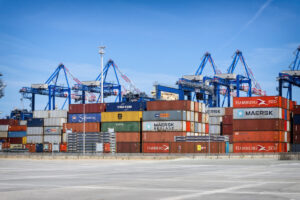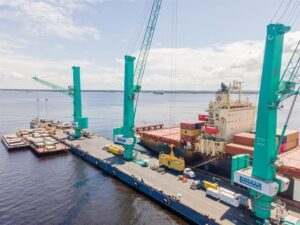Renting drones through a Drones-as-a-Service (DaaS) functionality could be the future business model for greater harnessing of the technology in global ports.
Smaller or intermediate ports with fewer resources have traditionally been hesitant to invest in a comprehensive fleet of drones for its maintenance, safety, and operational benefits due to the rapidly evolving capabilities of the technology.
However, utilising a DaaS model could be a prime solution for ports.
“Ports will more and more want to buy Drones-as-a-Service in the coming years,” explained Marc Kegelaers at Sabca-UAS.
In March 2021, aerospace manufacturer Sabca partnered with DEME Offshore to test autonomous drone usage at offshore wind farms in the North Sea.
For the future of drone usage in ports, Kegelaers said ports will instead request DaaS solutions on a case-by-case basis to help manage daily operations.
“From a port point of view, flying a drone is not their core business,” he said. “I’ve seen the reaction from ports that this technology goes so fast that they don’t want to buy something now, because three years from now it could be fully obsolete.”
Instead, Kegelaers says, ports could request services from a company that has the knowledge, technology, and “capacity of coevolve” with the technology to provide solutions at ports.
From there, ports can reap numerous benefits from a drone.
Ranging from maintenance, where drones can more comprehensively and quickly inspect the wear and tear of terminal equipment and quay walls; to safety, where a fleet of drones can provide a birds-eye-view image of a congested shipping schedule where a collision risk is high.
Building on the drone’s capabilities, Kegelaers said port operatives can equip drones with Artificial Intelligence (AI) capabilities to provide predictive analysis of those areas of maintenance to gantry crane wiring, for example.
The connectivity question
A fleet of drones will of course need a resilient and strong digital infrastructure to connect to in order to ensure the operator and drones do not falter in connectivity.
Ports around the world are investing in both commercial and private 5G networks and technologies to benefit their port operations. Will ports need to have their own private 5G network for the low latency and super-fast connectivity it brings?
“If you look at the drone industry, there’s a lot of people working very hard to make 5G the standard communication with their own specific port environment,” Kegelaers commented.
But on whether a private network for 5G will become the norm, Kegelaers says the jury is still out.
“What I’m seeing is that the public network providers can actually slice off a piece of the bandwidth and a piece of the network and a create a private network,” he said.
“It would only be accessed by that port, although on the infrastructure of the public network provider. So, this may be a hybrid solution.”
Hurdles remain
Kegelaers argues that small and intermediate ports are interested in utilising drones and DaaS technologies – but many are waiting on larger ports like the Port of Antwerp developing its use cases.
“We are in the face of the market where a lot of people are very interested but not everyone is able or willing to take the leap to investing in and do all the research for what is technologically feasible,” he said.
“I think the Port of Antwerp wants to play the role of an environment where all of these technologies are tested as an example of how things can be done.”
Kegelaers noted that as the industry continues to “trust build” with those use cases, increasing confidence in regulation of drone usage will continue also.
“Regulation so far made it very difficult to do sophisticated things and flying beyond visual line of sight with autonomous drones,” he said.
“But new regulation came out at the beginning of the year, so things are improving. Authorities are still learning but are quite nervous of whether they allow autonomous drones to be flying on a regular basis.
“We still need to do a bit of trust building.”








